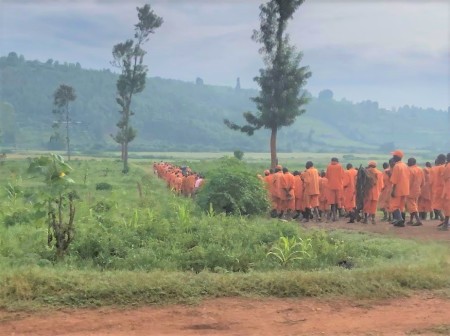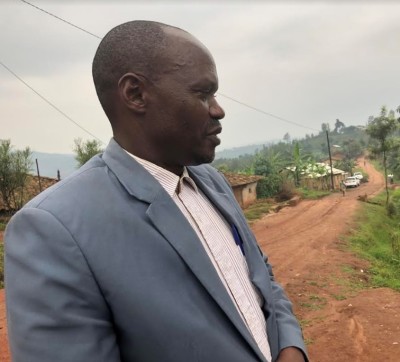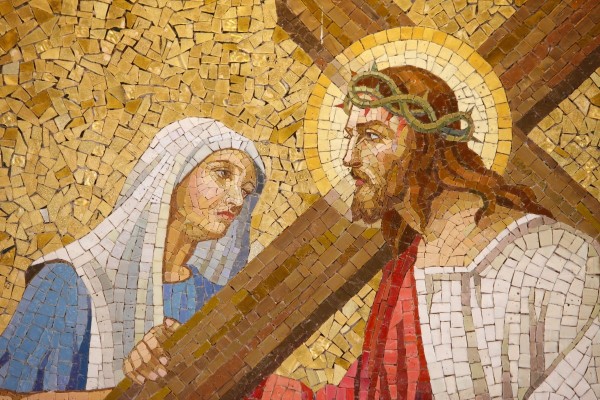Genocide killer turned 'prophet' led thousands of Rwandan prisoners to Christ and repentance

SOUTHERN PROVINCE, Rwanda — Callixte Karemangingo was among the thousands of Rwandans incited by extremist propaganda and nefarious leaders in government to carry out one of the worst atrocities the world has ever seen.
But that was before he became a Christian and realized he had spiritual gifts.
During the Genocide against the Tutsi in 1994, Tutsis looking to keep their lives were told to go to certain locations where they believed they would be safe.
As countless Tutsis gathered at these locations (in many cases churches or places of worship), many of them turned out to be slaughter traps.
Despite being a predominantly Christian nation, over 800,000 Tutsis and moderate Hutus were killed in the span of three months, from April to July 1994, by enraged Hutus and military forces. Neighbors killed neighbors and Christians killed Christians.
Callixte, a Hutu cattle farmer living in the Nyamagabe district, was among the Hutus who led his Tutsi neighbors to a "safe" place in their community despite knowing that was the place where they'd be executed.

Some of them were people he considered friends. But those relationships didn't stop him from leading them to certain death.
Why? Because there was hatred in his heart that was inspired by toxic extremism and government propaganda that led Callixte and tens of thousands of others to believe that Tutsis were the enemy of the Rwandan state.
But after the genocide ended and the rise of a new government, Callixte was sent to jail in May 1995. He was there along with thousands of other genocide perpetrators and even Hutus who had nothing to do with those crimes against humanity.
Spending five years in prison, Callixte eventually began a personal relationship with Christ.
"[I repented] on Feb. 8, 2000. That is when I had my revelation," Callixte told reporters who visited him, his wife, and their friends while on a trip with the humanitarian agency World Vision. "I had a voice telling me that the air is going to blow but the one who has repented of his sins from the bottom of his heart, that air will do nothing to him."
It was at that point that Callixte took his relationship with Christ to a new level. He was preached to and started reading the Bible on a consistent basis.
"That is when I started repenting of my sins, each and every sin. I mainly focused on the sin of participating in genocide," he said through a translator in his native tongue of Kinyarwanda.
"I was thinking about the Rwandans who were blamed for their tribe when they were not the ones guilty themselves. When I would think about it, I would just bust out and start crying."
Inspired by the word of God and the teachings of reconciliation and unity promoted by the Rwandan Patriotic Front, which rose to power following the genocide and end of the Rwandan Civil War, Callixte said he made the decision to live a godly life.
He said he knew that he should listen to the "good leadership" that rose to power in his country instead of the "bad leadership" that enabled the genocide to occur.
Songs of peace and reconciliation
As a musician, Callixte's change of heart inspired him to compose songs centered around love, unity, peace and reconciliation. He said he could prophesize through music.
"Those songs actually touched people's lives, mostly the prisoners, and they started to change their ways," he said. "When I started composing those songs, they started moving me [to different places] in other districts to sing those songs. I even went to the city to sing those songs."
Callixte also said he began preaching inside the overcrowded prison.
"I became a teacher of the community court within the prison. I could teach them about living with others," he explained. "I could always emphasize on the fact that God told me whoever asks for forgiveness, he would be forgiven."
At first, he said, his fellow prisoners were still influenced by the ideology that got them into prison and rejected his teachings. But eventually, he said, many prisoners started listening to him.
As a musician, Callixte got involved in different competitions where he sang songs and was even rewarded for it. Even though he was still a prisoner, he said the government allowed him to keep the money he earned from those competitions.
As he became a vocal leader among the prisoners, he said he helped lead at least 8,600 prisoners to repentance with many of them coming to know Christ.
"The number [8,600] is really small compared to the number of people that requested for forgiveness and were released because they told the truth," he said.
One of the main Bible passages Callixte would recite while preaching in the prisons was 1 Corinthians 1:1-30.
That passage calls for believers of Christ to be “perfectly united in mind and thought” — an idea that might have seemed far-fetched considering the ethnic tension that had existed in the country for at the time.
Callixte's request for fellow prisoners to repent of their sins was aided by the fact that the Rwandan government had launched an initiative allowing perpetrators to seek forgiveness through local community "Gacaca" courts.
The Gacaca initiative presented not only the opportunity for perpetrators to seek forgiveness of their crimes from their victims but also for community members to decide what a perpetrator's punishment should be.
This initiative was launched as there were too many cases for the nation's judiciary system to handle in a timely manner.
"Many people came to know Christ and confess their sins. I was preaching on two things: the Gacaca government directive and the word of God," Callixte recalled. "So for me, asking for forgiveness was not that difficult."
Follow Samuel Smith on Twitter: @IamSamSmith
or Facebook: SamuelSmithCP





















